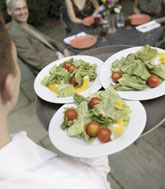For Food Handlers
Norovirus and Working With Food

About 50% of all outbreaks of food-related illness are caused by norovirus.
Foods commonly involved in outbreaks:
- leafy greens (such as lettuce)
- fresh fruits
- shellfish (such as oysters)
But, any food served raw or handled after being cooked can get contaminated.
Norovirus is a highly contagious virus that can make you very sick with diarrhea, throwing up, and stomach pain.
Anyone who works with food should know about this virus.
Foods Contaminated with Norovirus Can Make People Sick
Norovirus is a leading cause of illness from contaminated food in the United States.
The virus can easily contaminate food because it is very tiny and infective. It only takes a very small amount of virus particles (fewer than 100) to make someone sick.
Food can get contaminated with norovirus when:
- infected people who have stool or vomit on their hands touch the food,
- it is placed on counters or surfaces that have infectious stool or vomit on them, or
- tiny drops of vomit from an infected person spray through the air and land on the food.
Foods can also be contaminated at their source. For example:
- oysters that are harvested from contaminated water, or
- fruit and vegetables that are contaminated in the field.
Food Handlers with Norovirus Illness Can Spread the Virus to Others
People who have norovirus illness can shed billions of norovirus particles.
You are most contagious:
- when you are sick with norovirus illness, and
- during the first 3 days after you recover.
If you work with food when you have norovirus illness, you can spread the virus to others. You can easily contaminate food and drinks that you touch. People who consume the food or drinks can get norovirus and become sick. This can cause an outbreak.
Outbreaks of norovirus illness occur in nursing homes, hospitals, restaurants, cruise ships, schools, banquet halls, summer camps, and even at family dinners. These are all places where people often eat food handled or prepared by others.
About 50% of all outbreaks of food-related illness are caused by norovirus. In many of these cases, sick food handlers were involved in spreading the virus.
Ways That Food Handlers Can Help Prevent Norovirus from Spreading
Food handlers can follow some simple tips to prevent norovirus from spreading:
- Do not prepare food while you are sick
- Wash your hands carefully and frequently with soap and water
- Wash fruits and vegetables and cook shellfish thoroughly
- Clean and disinfect kitchen utensils, counters, and surfaces that may have norovirus on them
- Wash table linens, napkins, and other laundry thoroughly.
For more information, see Preventing Norovirus Infection.
Learn more about norovirus
Resources
- Norovirus Illness: Key Facts[238 KB, 2 pages] (Updated Sep 2012)
- Norovirus: Facts for Food Handlers[223 KB, 2 pages] (Updated Sep 2012)
- FDA Food Code
- FDA Employee Health and Personal Hygiene Handbook
Images and logos on this website which are trademarked/copyrighted or used with permission of the trademark/copyright or logo holder are not in the public domain. These images and logos have been licensed for or used with permission in the materials provided on this website. The materials in the form presented on this website may be used without seeking further permission. Any other use of trademarked/copyrighted images or logos requires permission from the trademark/copyright holder...more
![]() This graphic notice means that you are leaving an HHS Web site. For more information, please see the Exit Notification and Disclaimer policy.
This graphic notice means that you are leaving an HHS Web site. For more information, please see the Exit Notification and Disclaimer policy.
Contact Us:
- Centers for Disease Control and Prevention
1600 Clifton Rd
Atlanta, GA 30333 - 800-CDC-INFO
(800-232-4636)
TTY: (888) 232-6348 - New Hours of Operation
8am-8pm ET/Monday-Friday
Closed Holidays - cdcinfo@cdc.gov


